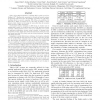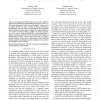1024 search results - page 122 / 205 » Fault Tolerance in Decentralized Systems |
121
click to vote
ICDCS
2012
IEEE
13 years 8 days ago
2012
IEEE
Today’s largest High Performance Computing (HPC) systems exceed one Petaflops (1015 floating point operations per second) and exascale systems are projected within seven years...
110
click to vote
ICDCS
2011
IEEE
13 years 9 months ago
2011
IEEE
Many distributed software systems allow participation by large numbers of untrusted, potentially faulty components on an open network. As faults are inevitable in this setting, th...
PRDC
2009
IEEE
15 years 4 months ago
2009
IEEE
—Fault injection (FI) has been shown to be an effective approach to assessing the dependability of software systems. To determine the impact of faults injected during FI, a given...
COMPSAC
1997
IEEE
15 years 2 months ago
1997
IEEE
We have investigated a fault injection-based technique for undermining the ability of software components to produce undesirable outputs into the state of the system. Undesirable ...
SAC
2006
ACM
14 years 9 months ago
2006
ACM
The objective of testing is to determine the conformance between a system and its specification. When testing distributed systems, the existence of multiple testers brings out the...


